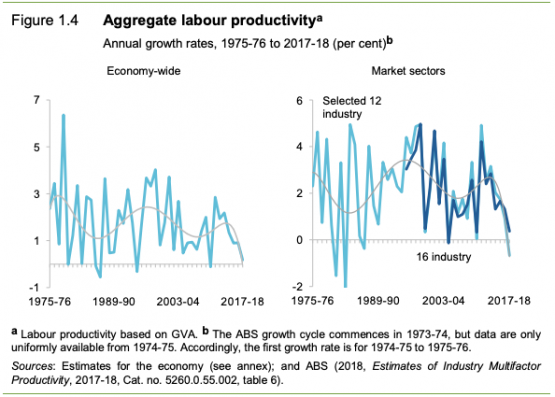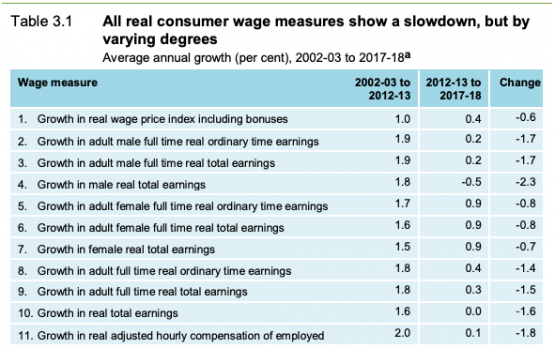
In a damning report, the Productivity Commission’s (PC) latest examination of the economy reveals that Australia has endured six years of poor productivity growth and wage stagnation, and slumping investment augurs poorly for a recovery any time soon.
The Commission’s 2019 Productivity Bulletin is an alarming itemisation of policy failure since 2012 that now sees productivity levels falling in crucial industries and no end in sight to the wage stagnation that has frustrated workers since 2013.
It confirms that the labour productivity (LP) surge under the Rudd-Gillard governments has been replaced with an extended period of declining productivity under the current government, with LP not merely well below long-run levels but falling every year between 2015 and 2018.

The problems described by the PC are particularly acute in the market sector of the economy, where LP went backwards in 2017-18, with the worst sectors being agriculture (likely culprit: the drought), construction, utilities and transport and logistics.
Manufacturing and the services sector were the best LP performers in 2017-18, both managing 3.7% growth. Multi-factor productivity (MFP) has followed the same trajectory of declining during the late Howard years, recovering in the period 2008-12, and then slumping again, with manufacturing and services again bucking the trend.
The Commission is also alarmed at a significant fall in both use of capital inputs and innovation — a word no longer spoken of in government after Malcolm Turnbull’s ill-fated embrace of it. The decline is notable, “especially so for investment in research and development,” the PC says, “where capital stocks are now falling, and even more so, new investment. Growth in R&D capital formation is even more subdued than capital formation generally, so that the R&D investment share of total investment has also fallen. The share of businesses that are innovators — which goes beyond R&D spending — is no longer growing.”
On wages, the Commission points out that:
While recent labour productivity growth has been sluggish by long-run standards, it has still been positive. However, this productivity improvement has not translated into comparable real wage growth over the period from 2011-12, with employees’ nominal hourly wages just keeping up with consumer prices.
This demolishes the persistent line from employer groups and the Coalition, that wages growth will pick up when productivity picks up — in fact any link between productivity growth and wages was severed years ago.

Nor does the PC buy the line advanced by some, including the Reserve Bank, that more than half a decade of wage stagnation is a kind of punishment for workers earning too many pay rises during the mining boom in the Howard years. This, at best, “may only partly explain recent wage and consumer price movements. Other countries have experienced low wage growth without any terms of trade shocks as their triggers. And real consumer wage growth in Australia has not shown any sign yet of a resurgence.”
It lists nine separate explanations for wage stagnation; interestingly, it declines to dismiss labour market regulation and the declining role of unions.
The union wage growth premium — an indication of union bargaining power — has not declined … That finding would not rule out weaker bargaining power by workers generally — whether represented by unions or not.
Accordingly, it offers no hope to workers that wage stagnation — predicted by Treasury and the government to vanish over the next two years — will end any time soon; the only comfort is that over the long-run, a widening gap between labour productivity and wages growth is “improbable”. That is, the PC thinks that it’s “improbable” that wage stagnation will get much worse over the course of the next decade. Australian workers must be weeping with gratitude.
What’s fascinating is that there was an alleged “productivity crisis” when Labor was in power, with acres of commentary in the media, economists and even the PC, often on the purported failings of the Gillard government and the Fair Work Act and how to fix them.
That “crisis”, it turned out, didn’t exist, as Treasury itself confessed years later. Not merely does it now appear that the Labor years saw a big lift in productivity from the depths created by WorkChoices (which Treasury famously warned Peter Costello would harm productivity) but that it has been replaced under the current government by a very real “productivity crisis” of the kind business and the commentariat whipped itself into a frenzy over eight years ago — and one with no end in sight.
And what’s that sound coming from business and the media? Crickets.








If I was on minimum wages I would do minimum work.
Top end of town gets a bonus for doing what there supposed to do!!!!!!!!!
And even when they do as they’re not supposed to do – behaviour like the banking royal commission revelations, share prices going down, bonuses based on contrived short-term increases in share prices while trashing the company’s long-term security (remember Sol Trujillo at Telstra?).
The lost decade, Bernard calls it. Well, guess who has been in office for 2/3rds of that decade? That would be your good mates from the Liberal-National Coalition. Not just at a Federal level (2013-2019) but also at a State level in many cases. So the loss of this decade must surely come from the failed twin strategies of Austerity & Trickle-down. Time for Neo-liberals to rip those articles of faith out of their bibles.
It must have deeply, deeply pained Bernard to have to type the sentence “It confirms that the labour productivity (LP) surge under the Rudd-Gillard governments has been replaced with an extended period of declining productivity.” For so long he’s told us the Gillard Government was terrible.
Alas, I fear this report will lead to renewed calls by the brain-dead Business Council for further cuts to wages and conditions to provide stimulus for business. Never mind that there is evidence this produces entirely the wrong outcome. It’s the only song the BCA knows, and it’s certainly the only song the current Government has on its playlist.
To be fair to Bernard, I remember many occasions when he has said that productivity improved faster under Labor governments than coalition governments. I think the argument goes, that when wages rise at a faster rate, it forces employers to improve their productivity to stay in business. In other words the conservative argument is turned on its head. Instead of productivity improvement coming first, and then wages improve by the trickle down effect from higher profits (Ha!), the reality is the opposite.
And SCOMO and Co. Trumpeting their alleged superior econonomic management credentials for the whole of the recent campaign, managed to suck in a majority of voters into believing it!!! Most of this was known before the election and believe it or not, Labor had policies to fix a lot of the Coalition’s blinkered incompetence and adherence to the bankrupt theory of a trickle down based economy!
It’s a mystery why Labor didn’t hammer the Coalition on this. The Coalition even had the hide to run ads warning of Labor’s debt, then they themselves have doubled it.
As for the promised tax cuts – it’s the lazy way to achieve growth. It’s similar to the way most dumb shit CEO’s fire workers to boost profitability. Would be much better to grow the economy and raise wages – most would be better off than with a tax cut on the never never.
Retail sales dead, wages dead, underemployment high, households drowning in debt…but exports smashing it, and company profits stupendous ..and…now this. And likely another pointless grind of the cash rate lever on the stops today – yet our corporate cheerleaders still want to lecture us about the ‘politics of envy’? Soz, but with all respect due, BCA (hint: it’s about = current GDP growth, in real terms): go eff yourselves.
That PC report is a deeply disdainful J’accuse! flung in the mugs of the lazy, timid, professionally in-bred and nepotistic, strategically moribund and sclerotic, and viciously feather-bedding gang of wealth-pilfering buccaneers who call themselves our Executive Class. The mediocre Boardroom daisy-chainers who know just enough Hayek and Friedman to dish out bullet-point platitudes about ‘productivity’ and ‘trickle down’ and ‘competitive corporate rate’ in place of formulating and funding actual concrete growth business plans and putting them into actual long term action. Who squeal ‘Class War!’ like stuck pigs if you as much as look twice sideways at their grubby little snouts hoovering up the subsidies and handouts and rorts at the taxpayer titty trough, along with their repulsive bonuses, awarded on sheltered workshop KPI achievements like farting without crapping their y-fronts two times out of three, or successfully being not dead.
Two decades of practically free money sloshing onshore in a thrillingly-disrupting global economic climate, where all and everything is up for joyous capitalist grabs. Fortune favouring the bold…and we get Clive f**king Palmer and John f**king Singleton and the IP f**king A. Lashings of stake banging on our flyscreen door for twenty years, sitting up like a friendly puppy, positively begging to be sunk deep and long into our new economic future, free blowjobs thrown in if need be to get the investment ball rolling…and what do we have to show for it? Little Jamie’s half-built LEGO turdpile-by-the-harbour (ran off sooking because some brute called him jelly-belly) and Clive’s odious ad campaign to have the taxpayer set up his train tracks so he and Gina and Modi’s mate don’t actually have to do any dollar-risky hard yards. Oh, and eight million negative equity mortgages none of us can service without pimping out our progeny for the next three generations.
Australia’s corporate leadership couldn’t capitalise its way out of a wet shit igloo. Without Rupert the Foreign Tax Bludger-in-Chief running PR shotgun on their welfare-propped business ineptitude, numbers like these would see every Australian Board and Executive tarred and feathered and run out of dodge faster than the surplus Josh achieved next year will become the deep recession tomorrow, one that is – of course, of course – all Labor’s fault, all over again.
What an embarrassing caste of capitalist fakes our sorry lot is. Imposters, posturers, poseurs, preeners. And they are fast turning us all into the dumb hillbilly service-trash underclass of the third millennium.
How good are we, but?! Eh?! How good are Orstraya’s Masters of the Yoonaverse?! How good!? Eh, ScoMo!? Eh?! Eh?!
Tldr: It takes talent, expertise and hard work to develop and implement policies for productivity growth. All are in short supply in the Coalition
BBSDFA
Oh, don’t hold back, Jack! Tell us what you really think
I wish I had your ability to string words and invective together. What will it take for the voters in this country to wake up.
Jack, in skewering the executive class, all highly credentialed with MBAs out their collective wazoos, you have hit the nail on the head. Nothing quite epitomizes Donald Horne’s mediocre but lucky people quite like our executive class.
Me, I go even further, looking squarely at the university class that created those goddamned MBAs. Fools who have never been in business educating people who are interested in how they can act like priceless parts.
But it’s all good. You know it, I know it. The revolution cometh.
The ABC program on ‘if I ceased to exist would it make any difference at work’ garnered hundreds of people saying no. In fact many people in middle management thought they were a hindrance to productivity and innovation. It reminded me of the’ Hitchhikers guide to the galaxy’ with the 3rd spaceship people wondering, after landing a long way from anywhere, where all the others were. I consider Morrison a 3rd spaceship captain.
And Australia is fully of middle managers, intermediaries and agents.
I know productivity in my workplace has dropped. When bonuses were virtually eliminated over the last 5 years, many of us reduced the amount of discretionary effort we put in. Nowadays, I only put in extra time if a job or the people involved make it compelling/worth my while.
There’s a great Dilbert cartoon on this in which Dilbert tells his boss that he intends to reduce his work quality to match the reduction in his forecast wage increase.
Productivity has plummeted in my work place, since the entire executive level were replaced. The new people are enthusiastic proponents of managerialism and have exploded the size of the place with, mostly, managers whose main role seems to be to have meetings and introduce formal processes and procedures that act as a brake on getting stuff done.